Are you looking for a Sugar Calendar review to see whether it’s the right WordPress calendar plugin for you?
With Sugar Calendar, you can add an events calendar anywhere on your website. You can then promote your webinars, seminars, conferences, meetups, and other events to visitors, and get more attendees.
In this Sugar Calendar review, we’ll help you decide whether it has everything you need to manage and promote events on your WordPress website.
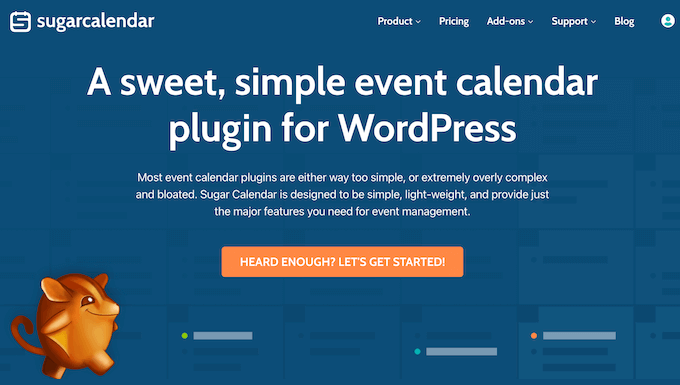
Sugar Calendar Review: Why Use It in WordPress?
Did you know event calendars can significantly boost website traffic and event attendance?
A calendar is a great way to share in-person and virtual events with the people who visit your website. There are several ways to promote your events, including using third-party platforms to add a Facebook event calendar to WordPress or add a Google Calendar to your site.
However, with Sugar Calendar you can create and manage events directly on your WordPress website, without using a third-party platform.
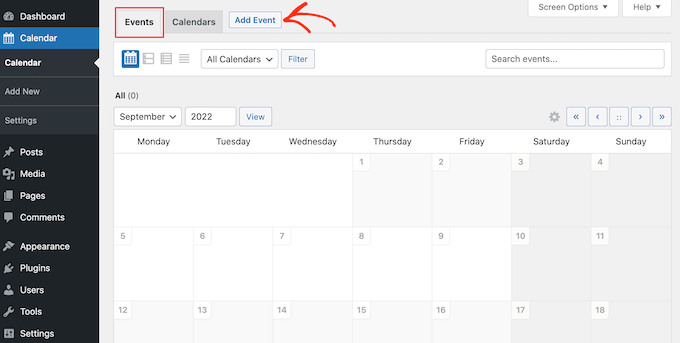
With Sugar Calendar, you can promote all kinds of events using the familiar WordPress dashboard and tools.
You can create as many calendars and events as you want, set the start and end times, add a location, and more.
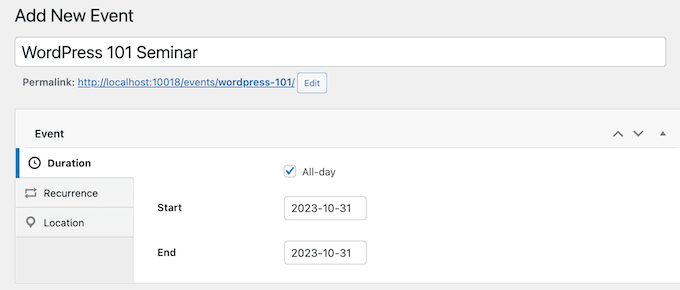
Sugar Calendar supports one-off, recurring, specific-duration, all-day, and multi-day events. This makes it perfect for promoting webinars, retreats, online sermons, and more.
You can even sell tickets to your events through Stripe or WooCommerce.
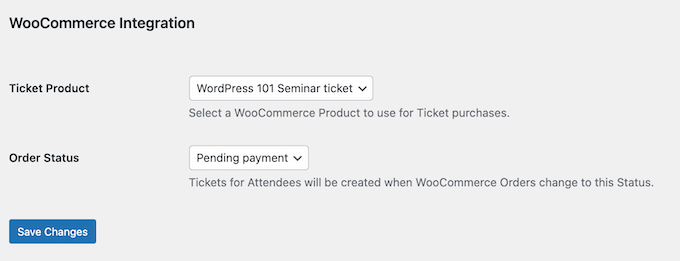
If you simply want to promote a few events or you’re working with a limited budget, then you can download Sugar Calendar Lite from the official WordPress repository.
This free plugin allows you to create a calendar and promote one-off events.
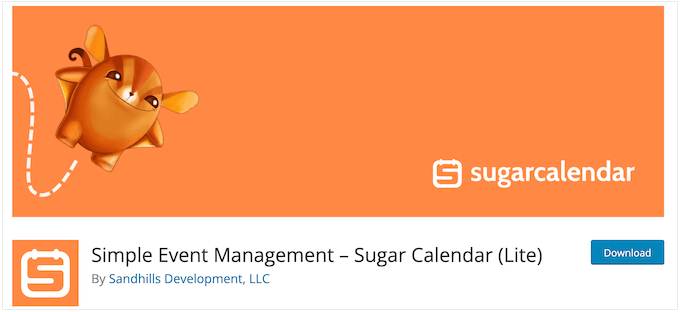
However, if you run recurring events or want to monetize your calendar by selling tickets, then you’ll need to upgrade to the premium plugin.
Sugar Calendar Review: Is It the Right Calendar Plugin for You?
With the right WordPress calendar plugin, you can promote all kinds of events, boost attendance, and even make money by selling tickets.
With that being said, in this Sugar Calendar review we’ll see if it’s the right calendar plugin for your WordPress website.
1. Easy User Interface
With Sugar Calendar, it’s easy to create as many calendars and events as you want. In fact, creating your first calendar is as easy as clicking a few buttons in the WordPress dashboard.
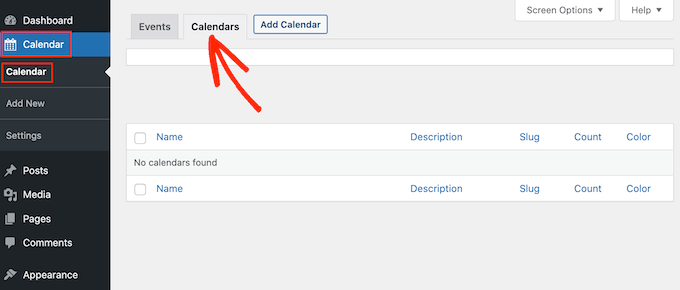
With that done, you can add Zoom meetings, webinars, meetups, and more to the calendar, by opening the ‘Events’ tab.
Then, just click on ‘Add Event’ and type in some information about the event.
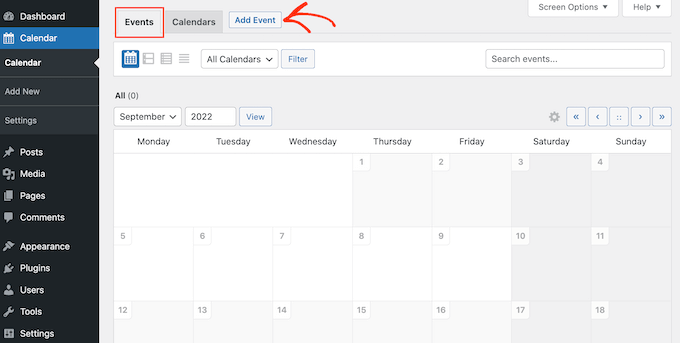
By repeating these simple steps, you can add an unlimited number of calendars and events to your WordPress website.
2. Create Recurring Events with Ease
Some events may be recurring. For example, you might run a webinar every Monday morning or have a monthly donations and fundraising event for your nonprofit organization.
Instead of adding each occurance to the calendar manually, Sugar Calendar lets you turn any event into a recurring daily, weekly, or monthly event.
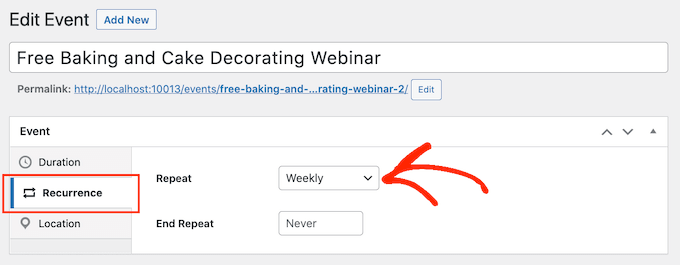
You can also mark them as multi-day, or single day events. In this way, you can quickly and easily populate your calendar with all your recurring meetings, conference calls, meetups, coaching calls, or similar.
If you want more options, then you can use the Advanced Recurring addon and set your events to recur based on custom combinations. For example, you might set a conference call to happen every 3 weeks, every 4 days, on the 2nd Tuesday of every month, or some other custom date.
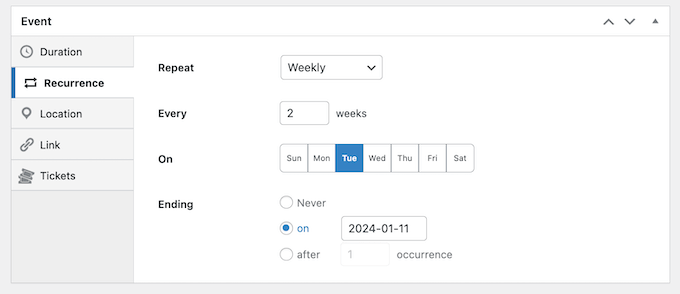
3. Support for Single and Multi-Day Events
With Sugar Calendar, you can set events to occur on a specific day or over multiple days. This is perfect for promoting longer events and conferences, festivals, and more.
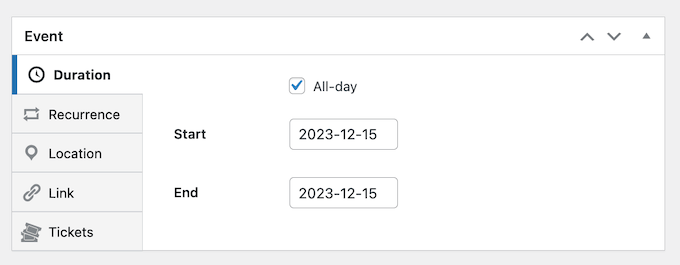
No matter whether you’re creating a single day event or multi-day event, you can enter a start and end time, or make it an all-day event.
4. Show Events in Any Time Zone
By default, Sugar Calendar will show the same date and time to everyone who visits your website. This may work well if you’re hosting in-person events, where everyone is physically present and in the same time zone.
If you need to, then you can easily change the default time zone in the plugin’s settings.
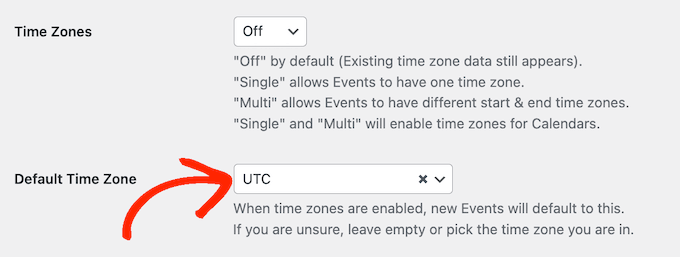
However, if you run virtual events, then attendees may be in different time zones.
With that in mind, Sugar Calendar can try to detect the visitor’s location and then adjust the date and time accordingly. This can improve the visitor experience and may even increase your attendees, since visitors will be less likely to get confused and miss events they planned to attend.

If you enable this visitor conversion feature, then you can customize how Sugar Calendar shows the date and time to visitors.
Firstly, there’s a ‘single’ option, which restricts events to a single time zone. This means the start and end date will both use the same time zone, which is typically the setting you’ll want to use.

However, there’s also a ‘multi’ mode which allows the event to start in one time zone, and finish in another. This is useful if you run a website that shares flight or travel information, as there’s a chance users might move between time zones.
As we’ve already seen in this Sugar Calendar review, by using the right time zone settings and enabling automatic conversion, you can help visitors plan their schedule and attend your events without any confusion.
5. Create Custom Event URLs
When you create an event, Sugar Calendar automatically creates a page for that event. Here, the visitor can see the start and end times, the date, the featured image, the description, and any other information you’ve added.

However, sometimes you may want to send the visitor to a different page, such as a landing page you’ve created using a page builder plugin.
You might even send visitors to an entirely different website, such as a marketing site you created to promote your upcoming conference.
To do this, you’ll need Sugar Calendar’s Events URL addon. After activating the addon, you can simply type in the link you want to use instead.
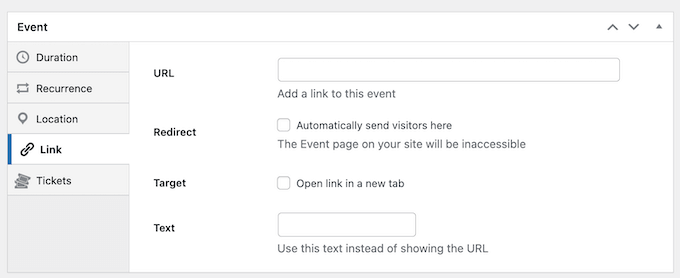
There are also some extra settings, so you can forward visitors to the URL automatically, open the link in a new tab, and more.
Another option is to add a link to the page that Sugar Calendar creates automatically. In this way, visitors will still see the default event page, before opening your custom link. For example, you might turn the URL into a call to action, or make it clear that you’re linking to an external website.

6. Add Calendars to Any Page, Post, or Widget-Ready Area
This Sugar Calendar review won’t be complete without showing you how to add the completed calendar to your website. When you’re happy with how the calendar is set up, you can place it on any WordPress page or post using shortcode.
By default, visitors can switch between your calendars using a dropdown menu. This is ideal for showing lots of calendars in a small amount of space.
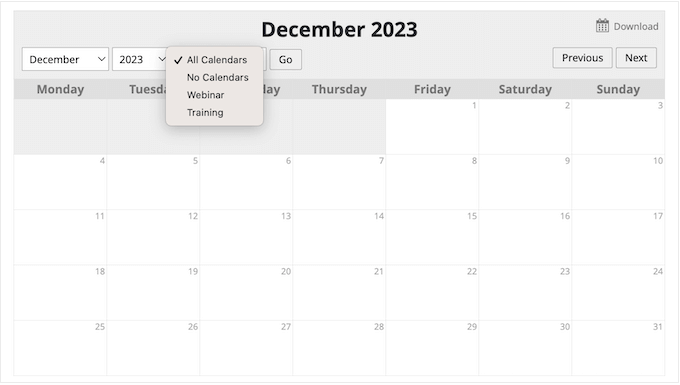
Another option is to show a specific calendar. For example, if you run a beauty salon then you might create a separate calendar for each staff member, so customers can see their schedule and availability.
You can then add the correct calendar to each employee’s page in your staff directory.

If you want to show the same calendar or events across your entire blog, website, or online store, then Sugar Calendar also has various widgets you can use:
- Calendar list. This shows a list of calendars, with a link to each calendar’s archive.
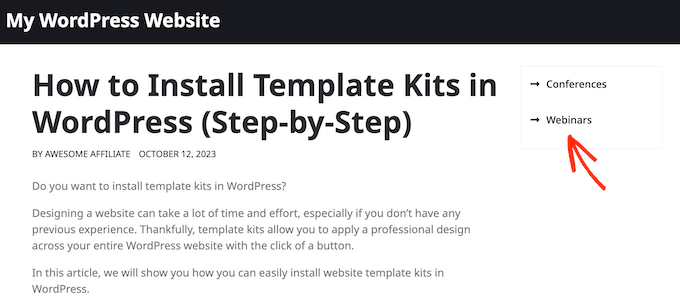
- Events calendar. This can show any calendar inside a widget-ready area such as the footer or sidebar.
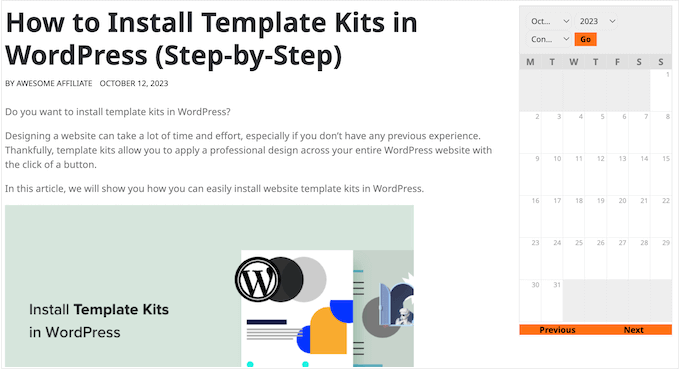
- Event filter. This adds links that visitors can use to filter events. For example, they may only want to see upcoming events, or in-progress events.
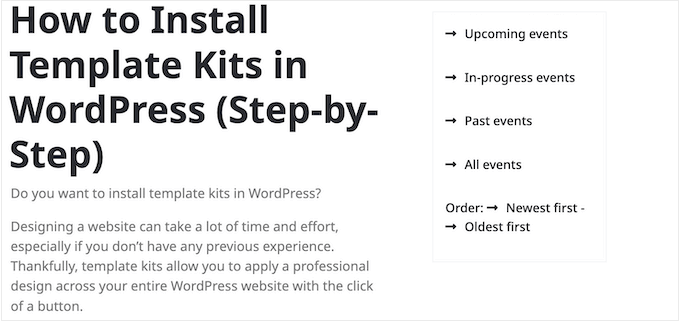
- Event list. This shows a list of upcoming events. When adding this widget to WordPress, you can choose how many events you want to show, and whether to show upcoming events or past events.

By using these widgets, visitors will be able to explore your calendars from any page or post.
For detailed step-by-step instructions, please see our guide on how to add and use widgets.
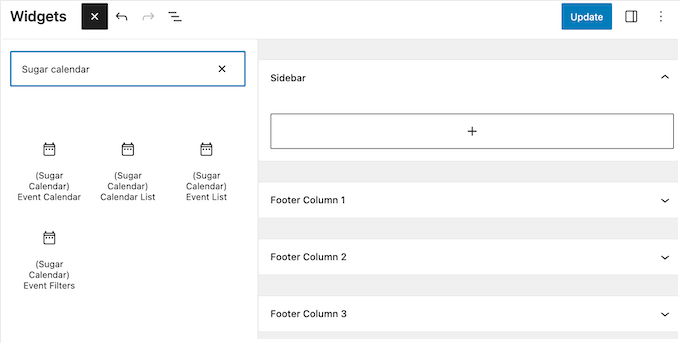
7. Sell Tickets Using Stripe or WooCommerce
You may want to make money online by selling tickets to your events.
Sugar Calendar can sell tickets through Stripe or WooCommerce using the Event Ticketing addon.

In the plugin’s settings, simply choose the page where you want to redirect customers after they buy a ticket, and a page where they can view their ticket.
Sugar Calendar creates these pages automatically, but you can replace them with custom pages if you prefer. For example, you might create a branded thank you page using a plugin such as SeedProd.
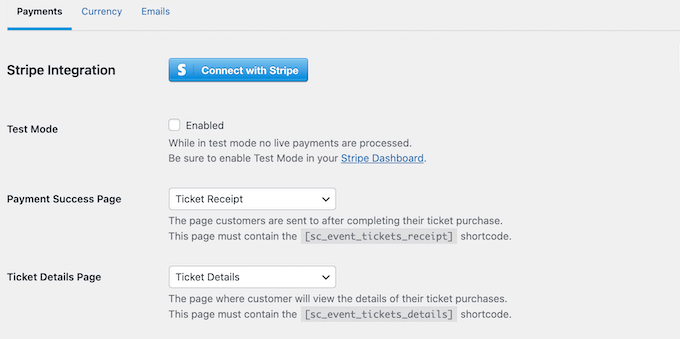
If you’re using WooCommerce, then you can create each ticket as a WooCommerce product.
This allows you to manage your tickets using the familiar WooCommerce tools.
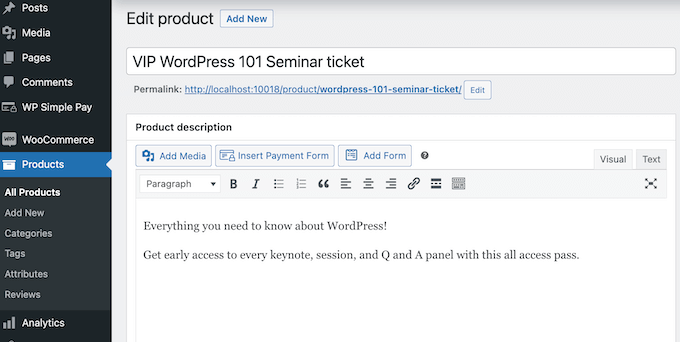
Every time someone buys a ticket, Sugar Calendar will send them a receipt via email.
These emails are fully customizable, so you can add your own custom logo and messaging.
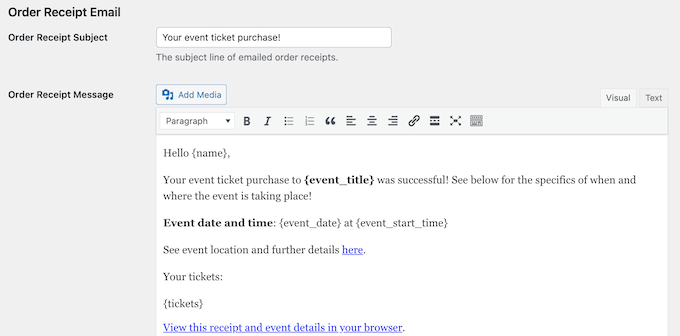
This automated workflow can save you a ton of time and effort, compared to emailing each attendee manually.
To help you track sales, Sugar Calendar has a single dashboard where you can see all your tickets and orders, along with information such as the order date, the event and ticket ID, the attendee’s name, and more.
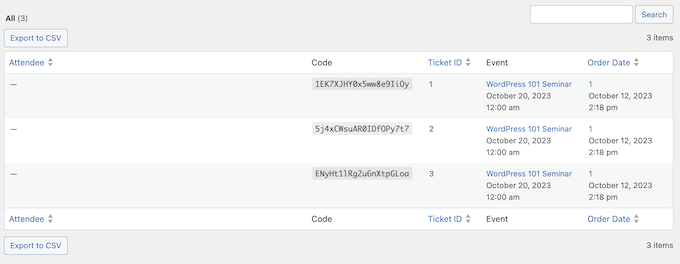
8. Integrate With Google Calendar, Apple Calendar, and More
With Sugar Calendar, visitors can subscribe to your event feeds from Google Calendar, Microsoft Outlook, Apple Calendar, and many other calendar applications.
After installing and activating the Calendar Feeds addon, you can enable Google Calendar, Webcal, and more in the Sugar Calendar settings.
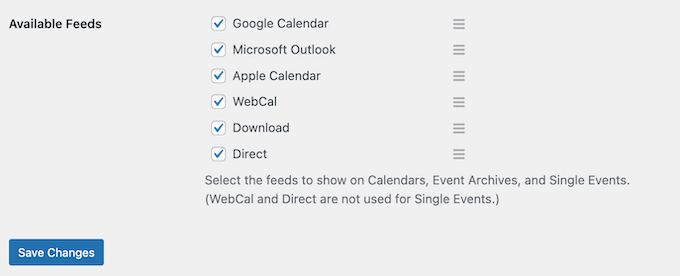
Sugar Calendar also supports .ics, which is a standard format for event data used by most calendar and event applications. With that in mind, visitors should have no problems using their favorite calendar app with Sugar Calendar.
The addon also enables a ‘Add to Calendar’ option on the individual event pages. In this way, visitors can add specific events to their favorite calendar application.

9. Accept User-Submitted Events
Crowdsourcing events for your WordPress calendar is a great way to build a community, attract new visitors, and keep your calendar updated with the latest events.
By adding events to your calendar, organizers can get free promotion and more attendees, while your visitors get to learn about events they may want to attend. This can keep people coming back to your site, and may even increase your blog traffic.
With Sugar Calendar’s Frontend Event Submissions, you can accept user-submitted events via a form.
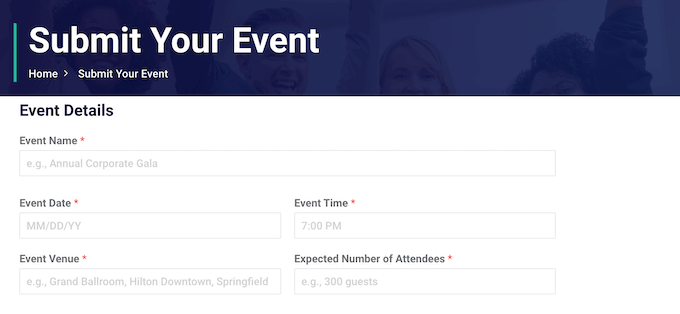
The Frontend Event Submissions addon integrates with all the best WordPress form plugins including WPForms.
With this addon, you can create an event submissions form that collects exactly the information you need, using the form builder you’re already familiar with.
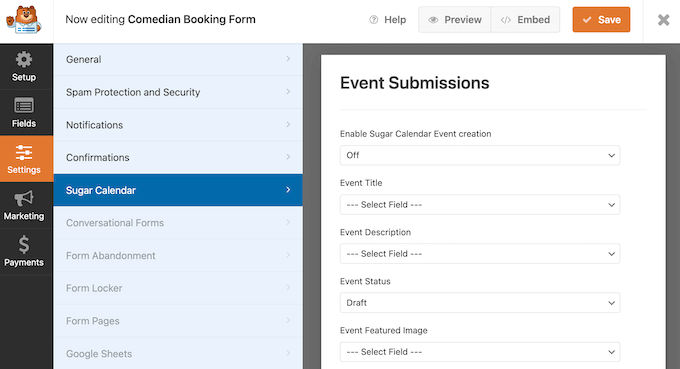
10. Create Automated Workflows With Zapier
Automation workflows can improve the visitor experience while saving you a ton of time. With that in mind, Sugar Calendar integrates with Zapier so you can automate repetitive tasks and connect with over 3,000 apps.
Using the Sugar Calendar and Zapier integration, you can:
- Subscribe new customers to a mailing list in MailChimp, ConvertKit, Aweber, and more.
- Notify visitors about new events, using your favorite email marketing service. In this way, Sugar Calendar can even help grow your email list.
- Sync events to online calendar services, such as Google Calendar.
- Sync customer order data and attendee information to Google Sheets.
11. Community and Professional Support
As you’ve seen in this Sugar Calendar review, you can add all kinds of events to your site without writing code or integrating with an external service like Google Calendar.
However, sometimes you may need some extra information, or help. If you prefer to find answers yourself, then Sugar Calendar has in-depth online documentation.
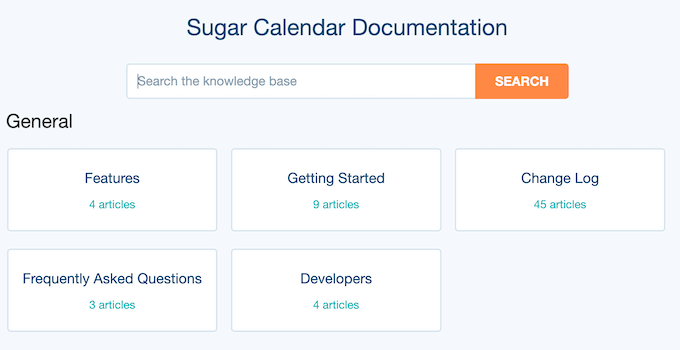
You can access this documentation no matter whether you’re using Sugar Calendar Lite or the premium upgrade.
There’s also the Sugar Calendar blog. Here, you’ll find detailed step-by-step tutorials on how to use the plugin’s specific features, plus general best practices on how to host virtual events and in-person events.
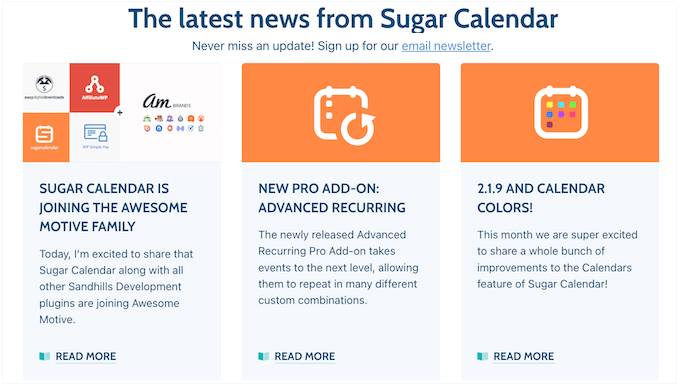
If you buy a premium license, then you’ll also get access to professional support.
Simply raise a ticket and the Sugar Calendar team will aim to respond as soon as possible.
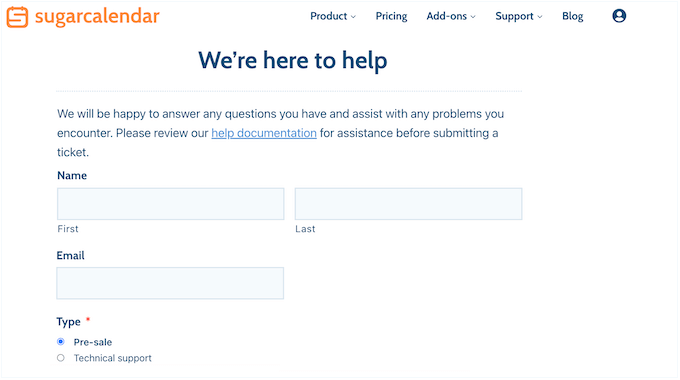
Sugar Calendar Review: Pricing Plans
If you’re looking for a free calendar plugin, then Sugar Calendar Lite allows you to create as many calendars as you want, and then add them to any page, post, or widget-ready area.
However, if you want to create recurring events, sell tickets, or sync with popular calendar apps such as Google Calendar, then you’ll need to upgrade to the premium plugin.
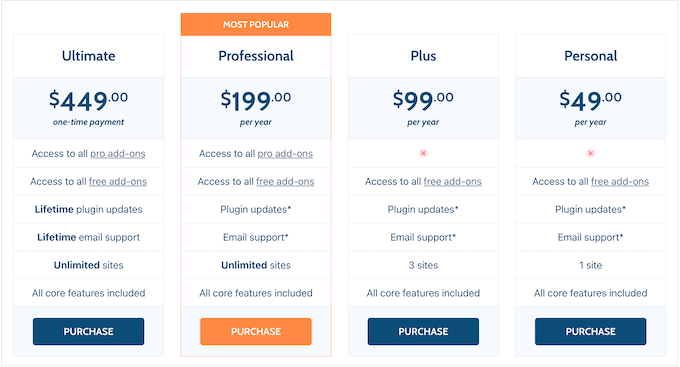
All the Sugar Calendar plans include the plugin’s core features. However, there are some key differences to keep in mind:
- Personal. For $49 per year, you’ll get access to email support so you can contact the Sugar Calendar team with any problems, questions, or requests.
- Plus. Priced at $99 per year, the Plus plan allows you to use Sugar Calendar on up to 3 WordPress blogs or websites.
- Professional. For $199 per year, this plan includes all the pro Sugar Calendar addons. This allows you to sell event tickets, create powerful automated workflows using Zapier, and subscribe to events using apps such as Google Calendar and Apple Calendar.
- Ultimate. Priced at $449 yer year, Ultimate gives you lifetime access to email support and updates. You can also use Sugar Calendar on an unlimited number of websites, so this is a great option if you run multiple WordPress sites, or you’re a WordPress development agency who works with a list of clients.
Sugar Calendar Review: Is it Worth It?
To summarize this Sugar Calendar review, we’re confident that it’s the best WordPress calendar plugin on the market. This plugin makes it easy to promote all kinds of virtual and in-person events on your website, blog, or online marketplace.
If you’re looking for a free calendar plugin, then Sugar Calendar Lite is a great option. With this plugin, you can add a calendar to any page, post, or widget-ready area using either a shortcode or widget.
However, if you want to sell tickets online, sync with calendar apps, or create recurring events, then you’ll need to upgrade to the premium plugin.
If you want to use Sugar Calendar on multiple websites, then Plus is a great option. However, if you want to use the pro addons, then we recommend upgrading to Sugar Calendar Professional. This gives you unlimited access to all the addons, so you can accept user-submitted events, sell tickets online using Stripe or WooCommerce, and more.
Finally, if you work with clients or run a network of websites, then Ultimate allows you to use Sugar Calendar on an unlimited number of sites. You’ll also receive plugin updates and email support for life, making this an affordable plan for businesses of all sizes.
We hope this Sugar Calendar review helped you decide whether it’s the right calendar plugin for your WordPress website. You can also check out our guide on how to create a contact form in WordPress, or see our expert pick of the best live chat software.
If you liked this article, then please subscribe to our YouTube Channel for WordPress video tutorials. You can also find us on Twitter and Facebook.



Syed Balkhi says
Hey WPBeginner readers,
Did you know you can win exciting prizes by commenting on WPBeginner?
Every month, our top blog commenters will win HUGE rewards, including premium WordPress plugin licenses and cash prizes.
You can get more details about the contest from here.
Start sharing your thoughts below to stand a chance to win!